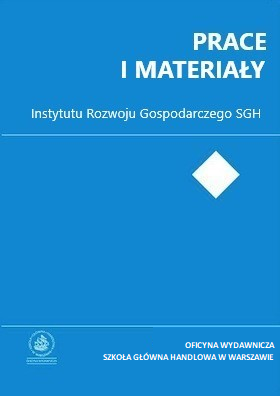The Institutional Conditions of Political Business Cycle
Main Article Content
Abstract
The research paper refers to the significant social and economic problem that is not recognizing the effects of the political business cycle. It has been reviewed in the paper the past experience in the operation of fiscal rules in the EU and pointed out their shortcomings. Particular attention was paid to the independent fiscal institutions as entities with which the political temptation to keep the ineffective economic policies could be reduced. Pointed Polish experience in the ratification of the fiscal pact and presented the theoretical justification for the establishment of the Fiscal Council.(original abstract)
Article Details
References
A Fiscal Compact for a Stronger Economic and Monetary Union, Monthly Bulletin, ECB, May 2012.
Auerbach, A. J., Gorodnichenko Y., Measuring the output responses to fiscal policy, NBER Working Paper, 2010, No. 16311.
Calmfors L., Corsetti G., Hassler J., Saint-Paul G., i inni "Chapter 5: The Hungarian Crisis", EEAG Report on the European Economy 2012.
Calmfors L., The Role of Independent Fiscal Institutions, Stockholm University and Swedish Policy Council, 2010.
Debrun X., Democratic Accountability, Deficit Bias and Independent Fiscal Agencies,”IMF Working Paper”, July 2011.
Draft Principles for Independent Fiscal Institutions, OECD Parliamentary Budget Officials and Independent Fiscal Institutions, 4th Annual Meeting, Paris, 23-24 February 2012.
Graj D., Komu służy pakt fiskalny, „Rzeczpospolita”, 19 lutego 2012.
Hagemann R., Improving Fiscal Performance Through Fiscal Councils, OECD Working Paper, France, 2010, No. 829.
Hendershott P. H., Villani K., What Made the Financial Crisis Systemic?, Policy Analysis, CATO Institute, 6 March 2012, No. 693.
Hibbs D.A., Political Parties and Macroeconomic Policy, “The American Political Science Review”, 1977, Vol. 71.
Kopits G., Independent Fiscal Institutions: Developing Good Practices, Stockholm, 2011 - Draft prepared for the Third Annual Meeting of OECD Parliamentary Budget Officials Kopits G., Symansky S., Fiscal Policy Rules, IMF, Occasional Paper, Washington 1998, No. 162.
Kornai J., Where is The Line Between Independent Economic Analysis and Active Policy Making? The example of The Independent Fiscal Councils, Acta Oeconomica, No. 60.
Kovacs B., Gyongyi C., The role of independent fiscal institutions in managing the European sovereign debt crisis: The case of the United Kingdom, Germany and Poland, MPRA Paper, 2012, No. 40354.
Nordhaus W. D., The Political Business Cycle, Review of Economic Studies, 1975, No. 42.
Ódor L., Kiss P.G., Kivetel Erositi? Fiskalis szabalyok a visegradi orszagokban (Exception proves? Fiscal rules in the Visegrad countries), MNB Szemle, 6, 2.
Public Finances in EMU 2006, European Economy, European Commission, Directorate General for Economic and Financial Affairs, 2006, No. 3.
Pacześ P., Polityczne aspekty cyklu koniunkturalnego, Myśl Ekonomiczna i Prawna, WSHiP, 2008, nr 1 (20).
Swedish Fiscal Policy, Fiscal Policy Council Report, 2012.
